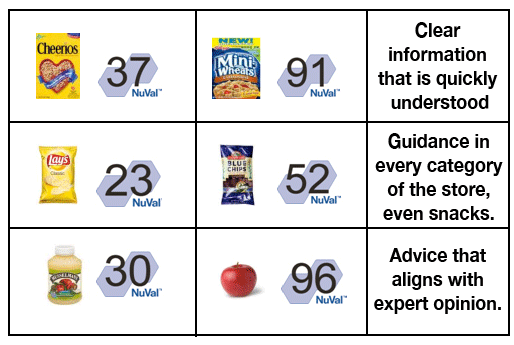
According to the U.S. Food and Drug Administration, the average shopper buys 61 items in the typical 26-minute grocery shopping trip. This calculates to less than 30 seconds to consider various brands, price, size and nutrition before finalizing a decision on which product to buy. Navigating the more than 40,000 items stocked in a typical store is a challenging chore for even the most health-conscious consumers, and undoubtedly, you hear about it when working with clients.
The NuVal™ Nutritional Scoring System is a new decision-making tool designed to help shoppers make sound nutritional purchasing decisions in every category of food. The system works by ranking food from 1 to 100; the higher the score, the higher the overall nutrition. For example, a box of regular General Mills Cheerios® rates a 37, while a box of Kellogg’s® Mini-Wheats® Unfrosted earns a 91. Additionally, a bag of regular Lay’s® potato chips earns just 23 NuVal™ points, rendering Garden of Eatin’® Blue Chips a better snack choice at 52.

NuVal™ Scores are available during point-of-purchase in more than 750 grocery stores in 22 states, with plans to expand into additional states in the near future. Featured in a double-hexagon logo, the score is posted directly on the price tag, and all brands—national, regional and private label—are scored, giving consumers the opportunity to compare all products.
Built by a team of medical and nutrition experts led by Dr. David Katz, co-founder and director of the Yale Prevention Research Center, the NuVal™ scoring algorithm that fuels the scores draws on a combination of several key factors: nutrients that positively and negatively impact health, the concentration of each nutrient in comparison to a recommended “healthy” diet, the quality of the macronutrients and the relationship of each nutrient to health outcomes.